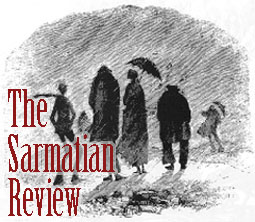| This Issue | Back Issues | Editorial Board | Contact Information |

September 2006
Volume XXVI, No. 3
We find it instructive to return to Van Norman‘s not-so-famous book. It resonates with concerns that continue to be valid today, and it is free of today‘s prejudices and blind spots. When Van Norman states that the history of Poland is worthy of a Tacitus, one is startled at first. This is not what history books usually say. The Poles lost, therefore, they were in the wrong. But not necessarily. It is good to be reminded of a valuation system that does not put power and wealth first. Its strangeness reminds us that our own discourse is not a universal one. Nor is Van Norman just a flatterer-his ennumeration of Polish shortcomings sounds familiar even today.
Among these shortcomings is a slowness to get one’s act together in the political arena, as well as disregard for public relations. Polish politicians seem to ignore the image of Polish politics they have been creating inside the country and abroad. The 2005 elections in Poland brought to power a party (PiS, or the Law and Justice Party) that, for the first time in postcommunist history, had no ties in the establishment of “People’s Poland.” Upon coming to power PiS proclaimed its committment to liberty, democracy, and friendship with the United States. So far, so good-but has it delivered? As this issue goes to print, PiS’s excellent Prime Minister, Kazimierz Marcinkiewicz, has resigned, to be replaced by the president’s twin brother. Can he credibly form a new government? Other resignations preceded Mr. Marcinkiewicz’s. Early elections seem in the offing.
One notes with regret the inexperience of the leading PiS politicians. A May 2006 article in the German daily Tageszeitung made fun of President Lech Kaczynski, and apparently the President was so upset by the admittedly vulgar humor of the article that he called off his trip to the meeting of German, Polish, and French presidents, under a thinly veiled excuse that he had health problems. Nosy journalists found out they were stomach problems. More jokes.
So far as we can see, the Tageszeitung parody was done in the tradition of “Saturday Night Live,” an intensely funny and occasionally brutal American TV series that has taken on virtually every living U.S. President, and some of the deceased ones. In it, President Bush is often presented in a distincly unflattering light, and the inane “interviews” with him are hard-hitting and hilarious. President Kaczynski must learn to live with this sort of thing. In a democratic world, a public figure is public property-one can play football on it. Those with delicate skin should not go into politics. As the proverb says, if you cannot stand the heat, get out of the kitchen.
Back to the September 2006 Issue
The Sarmatian Review
sarmatia@rice.edu
Last updated 9/22/06